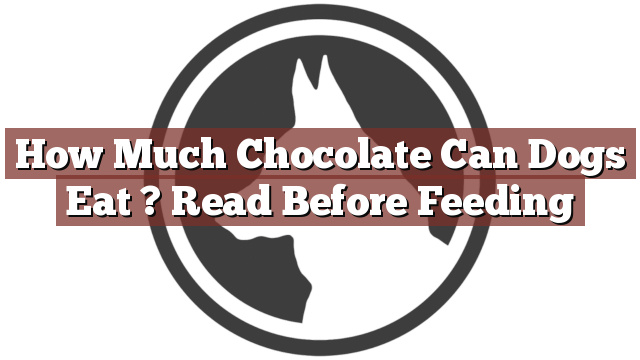Understanding Your Dog’s Dietary Needs
As responsible pet owners, it is crucial to have a good understanding of our dogs’ dietary needs. While we may be tempted to share our favorite treats with them, it is important to remember that not all human foods are safe for dogs. One such food item that is often found in our households is chocolate. So, can dogs eat chocolate?
How Much Chocolate Can Dogs Eat? Read Before Feeding
Can dogs eat chocolate? The simple and straightforward answer is no. Chocolate contains a substance called theobromine, which is toxic to dogs. While humans can metabolize theobromine efficiently, dogs process it much more slowly, leading to a buildup of this harmful substance in their system. Even small amounts of chocolate can cause various health issues in dogs, ranging from mild gastrointestinal upset to severe poisoning, and in some cases, it can even be fatal.
It’s important to note that the type of chocolate and the dog’s size can also significantly impact the level of toxicity. Dark chocolate and unsweetened cocoa powder have higher theobromine content compared to milk chocolate, making them more dangerous for dogs. Additionally, smaller breeds are more susceptible to the effects of theobromine as their bodies are not able to eliminate it as efficiently as larger dogs.
Pros and Cons of Feeding Chocolate to Dogs
When it comes to feeding chocolate to dogs, there are no pros, only cons. The cons heavily outweigh any potential benefits. As mentioned earlier, the theobromine content in chocolate can lead to various health issues in dogs, including vomiting, diarrhea, increased heart rate, tremors, seizures, and even death. These symptoms can appear within a few hours of ingestion and may require immediate veterinary attention.
It is essential to remember that prevention is always better than cure. Keeping chocolate and other potentially harmful foods out of your dog’s reach is the best way to ensure their safety and well-being. If you suspect that your dog has accidentally consumed chocolate, it is crucial to contact your veterinarian immediately for guidance.
In Conclusion: Chocolate and Dogs – A Dangerous Combination
In conclusion, it is vital to understand that chocolate is not suitable for dogs under any circumstances. The theobromine present in chocolate can have severe toxic effects on dogs, potentially leading to fatal consequences. As responsible pet owners, it is our duty to keep our furry friends safe by keeping chocolate out of their reach and ensuring they have a balanced and healthy diet that meets their specific dietary needs. Always consult with a veterinarian regarding any concerns or questions related to your dog’s diet to ensure their well-being and longevity.
Thank you for taking the time to read through our exploration of [page_title]. As every dog lover knows, our furry friends have unique dietary needs and responses, often varying from one canine to another. This is why it's paramount to approach any changes in their diet with caution and knowledge.
Before introducing any new treats or making alterations to your dog's diet based on our insights, it's crucial to consult with a veterinarian about [page_title]. Their expertise ensures that the choices you make are well-suited to your particular pet's health and well-being.
Even seemingly harmless foods can sometimes lead to allergic reactions or digestive issues, which is why monitoring your dog after introducing any new food item is essential.
The content provided here on [page_title] is crafted with care, thorough research, and a genuine love for dogs. Nevertheless, it serves as a general guideline and should not be considered a substitute for professional veterinary advice.
Always prioritize the expert insights of your veterinarian, and remember that the health and happiness of your furry companion come first.
May your journey with your pet continue to be filled with joy, love, and safe culinary adventures. Happy reading, and even happier snacking for your canine friend!

